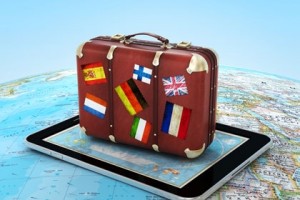IT Security for the summer holidays
Posted on: 11 August 2015
By: wolfeg
No Comments »
Filed under: Uncategorized
This month, Graeme Wolfe, our Information and IT Security Officer, looks at some of the scams and tricks that can be used against us all during the holiday period and also provides some security advice to travellers using mobile devices.
IT Security for the summer holidays
At this time of year many of us will be travelling to new or different places for our holidays, making lots of on line bookings or reservations and receiving various holiday related emails and messages.
Scammers know this is the case and take advantage by sending ‘holiday’ related scam mails or posing as legitimate travel related web sites, to try and get hold of your personal information or to try and relieve you of your hard earned money.
Scams and tricksters
Since most Government departments went down a ‘Digital by Default’ path, to deliver services to us, many services can now be accessed on line; however, there have been a number of sites that have opened up offering to provide these same services to us, but at a price. In some cases, charging for things you can get for free.
Examples of holiday related government services:
- EHIC (European Health Insurance Card) This is FREE from the NHS
- Passport applications and renewals. There are charges for passports and you can apply and find out more about all the details on Gov.uk
- Visas for Holiday destinations. Details of countries’ entry requirements, along with any other help and advice can be found on Gov.uk
- ESTA (Electronic System for Travel Authorization) For travel to the USA. This costs $14 and can be found on this official site.
Sites that offer to provide such services, are not necessarily breaking the law, as long as they clearly state that they are offering ‘additional services’, even if in reality they aren’t. The two most common such sites are those offering EHIC and ESTA services.
Also watch out for ‘Holiday’ related emails for flights, hotels, car hire, foreign exchange etc. both at work and at home, which can pop up around this time of year in the hope that you will think they are genuine or accidentally click on them without thinking.
Other things to consider are:
- Social media – Be careful what you post. “Just off for two weeks of Sun and Rum in Barbados” tells your friends and anyone else who cares to look, that your place will be unoccupied for a long period of time.
- Out of Office – Again, just some simple information that you are not in the office, when you expect to return and alternate contact details, is all you need to say.
- Voicemail – Something simple like “I am unavailable at the moment, please leave a message” is sufficient, like for item 2 above.
Using portable devices in new locations.
There are a few things you should take into consideration when using any mobile device in a new location, such as on holiday or in a different country.
Public Wi-Fi:
- Public Wi-Fi is inherently insecure, so be cautious.
- Many places now offer free Wi-Fi as part of the services available during your stay. This can be a great way to cut the costs of using a device abroad, but as with any Wi-Fi service, make sure you are connecting to the service provided by the owner i.e. Starbucks or Hilton not $tarrbucks or Hillton
- If you are connecting to a Wi-Fi service, check it is secured using WPA security as a bare minimum and WPA2 is better.
- Public Wi-Fi services in some parts of the world may be routinely monitored and as such your connection, and any data transferred over it, may not be 100% secure.
- When logging into sites over public Wi-Fi, make sure you also log out of them afterwards.
Charging your Device:
- Don’t forget your charger and lead. It might seem obvious, but it can be overlooked.
- Travel adaptor – have you got a suitable one for the country you are visiting?
- Charge your device fully before leaving home. You don’t know whether you can charge it ‘in transit’ so start with 100%.
- You can buy ‘portable batteries’ that can be precharged and kept for emergency use.
Mobile data costs:
- Your UK mobile service provider may not have an equivalent in the country you are visiting, so you will need to select one from a list of options your device will provide you with. (if it has a working SIM installed of course)
- Once you have selected your new mobile network you should receive a text advising you of the costs of calls, texts and data in your new location.
- Some contracts will enable you to use your UK allowances in foreign climes, others won’t, so before you leave, check and don’t start posting all your holiday snaps on social media until you know for sure. Don’t get saddled with a huge bill on your return.
- If you are unsure or don’t want to pay ‘roaming data’ charges then turn this facility off on your device.
Graeme Wolfe
IT Security Officer
11/08/2015
- Flash, a-ah, still not quite dead, yet. - June 18, 2018
- GDPR – Arriving this month - May 17, 2018
- Facebook – what’s going on and should I be worried? - April 12, 2018




Leave a Reply